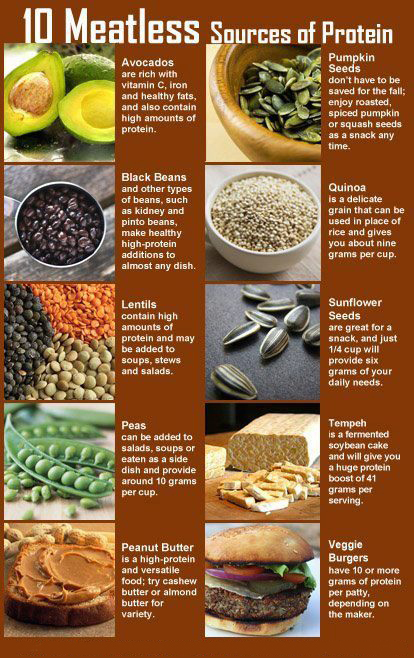Myth #17: “But I need to eat meat to get my protein.”
While protein is indeed one of the three macronutrients that humans need to maintain good health (the other two being carbohydrates & fats), almost all of the world’s humans (especially those capable of reading this article) actually eat too much protein, not too little. Especially in the United States, it has been estimated that humans ingest 2-6 times more protein than is healthy for them. And ingesting excess animal protein has been clearly linked to kidney disease, osteoporosis, several types of cancer, type 2 diabetes and cardiovascular disease. As such, at least as far as we humans are concerned, plant-based sources of protein* are definitely far superior to animal-based ones.
Besides, from where do you think those same animals get the protein in their flesh? That’s right … from plants! Getting your protein from plant sources simply cuts out the “middle man” — and cuts out cancer, diabetes, heart disease & unethical callousness while you’re at it.
Current status of this Myth: Exposed
Justification it provides for eating animals: NONE
“We’ve never treated a single patient with protein deficiency; yet the majority of patients we do see are suffering from heart disease, diabetes, and other chronic illnesses that are the directly result of trying to get enough protein.” ~ Dr. Matthew Lederman
*A standard 50g beef burger contains 10.2 grams of protein and three 90g fish sticks contain 12.l grams … In comparison, one cup of kidney beans contains 13 grams of protein, an average serving of pasta (190g cooked) contains 8.5 grams of protein, a few handfuls of almonds (50g) contain 11 grams pf protein, a large handful of pumpkin seeds (50g) contains over 16 grams of protein, one cup of buckwheat contains 24 grams of protein, one cup of tofu contains 11 grams of protein, one cup of wild rice contains 7 grams of protein, one cup of lentils contains 18 grams of protein, and one cup of quinoa contains 9 grams of protein … And, while it is true that – with the exception of soy products & quinoa – animal products are the only foods containing all nine essential amino acids, combining plant-based alternatives (two or more different legumes, grains, vegetables, nuts or seeds) easily provides all the amino acids a healthy human needs.





 ;
;